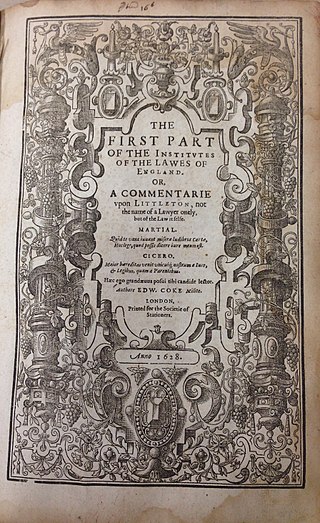Top Qs
Timeline
Chat
Perspective
Institutes of the Lawes of England
Legal treatises by Sir Edward Coke From Wikipedia, the free encyclopedia
Remove ads
The Institutes of the Lawes of England are a series of legal treatises written by Sir Edward Coke. They were first published, in stages, between 1628 and 1644.[1] Widely recognized as a foundational document of the common law, they have been cited in over 70 cases decided by the Supreme Court of the United States,[2] including several landmark cases. For example, in Roe v. Wade (1973),[3] Coke's Institutes are cited as evidence that under old English common law, an abortion performed before quickening was not an indictable offence. In the much earlier case of United States v. E. C. Knight Co. (1895),[4] Coke's Institutes are quoted at some length for their definition of monopolies.[5] Sir Edward Coke’s Institutes also had a significant influence on the development of legal principles in the American colonies. For instance, the Institutes were highly regarded by early American legal scholars and practitioners, including Thomas Jefferson, who referenced Coke’s work in his writings on legal theory and the foundation of American law. This influence helped shape the legal system of the United States in its formative years. The Institutes's various reprinted editions well into the 19th century is a clear indication of the long lasting value placed on this work throughout especially the 18th century in Britain and Europe. It has also been associated through the years with high literary connections. For example, David Hume in 1764 requested it from the bookseller Andrew Millar in a cheap format for a French friend.[6]
Remove ads
Contents

First Part
The First Part's subtitle is a "Commentary upon Littleton", concerning land law and property law. Often called Coke on Littleton (abbreviated "Co. Litt."), it is a commentary on Thomas de Littleton's treatise on land tenure.[8]
Second Part
The Second Part's subtitle is "Containing the Exposition of Many Ancient and Other Statutes", particularly Magna Carta.[9]
Third Part
The Third Part's subtitle is "Concerning High Treason and other Please of the Crown and Criminal Causes".
Fourth Part
The Fourth Part's subtitle is "Concerning the Jurisdiction of the Courts".
This section needs expansion. You can help by adding to it. (October 2020) |
Remove ads
See also
Notes
External links
Wikiwand - on
Seamless Wikipedia browsing. On steroids.
Remove ads

